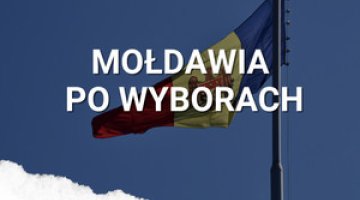Rapprochement: Moldova’s president visits Kyiv
On 27 June Moldova’s President Maia Sandu paid an official visit to Kyiv, the first since Russia’s invasion of Ukraine. She met, among other officials, President Volodymyr Zelensky, and visited Bucha, Irpin and Borodyanka. During her visit Sandu pledged Moldova’s support for the ‘brave Ukrainian nation’ and declared further assistance for Ukrainian refugees in Moldova (for the last four months approximately 100,000 of them have been permanently resident in Moldova, which has a population of 2.5 million). She announced that Moldova would seek to increase the transit of Ukrainian goods through its territory. Ukrainian and Moldovan politicians also agreed to develop energy and economic cooperation and to take joint action towards the further integration of both countries with the EU. Referring to the separatist, Russia-controlled Transnistria, Zelensky firmly stated that any measures taken from Transnistria which pose a threat to Ukraine would be met with an adequate response. Sandu announced that the Moldovan government was not expecting a direct threat from Transnistria and was doing its best to prevent it. Moldova is concerned about Ukraine potentially launching a pre-emptive attack on Transnistria, which is de jure Moldova’s territory.
Commentary
- Sandu’s visit to Ukraine is an important signal proving that relations between Moldova and Ukraine, which have been rather cool in recent months, are improving. Representatives of both the Ukrainian government and experts have repeatedly criticised Moldova for failing to provide sufficient assistance to Ukraine and not sufficiently clearly condemning Russia’s politics, in particular not having joined the West in the sanctions against Russia. In mid-April Ukraine’s Deputy Prime Minister Iryna Vereshchuk said that her country was receiving greater assistance ‘even from Colombia’ and called on Sandu to adopt a tougher position on Russia. Ukraine has also been critical of Moldova’s decision to submit its EU membership application (in response to Ukraine’s analogous move) and has seen it as an attempt to achieve Moldova’s political goals at the expense of Ukraine’s tragedy. At the beginning of March, Ukraine’s Foreign Minister Dmytro Kuleba even demanded that the EU consider Ukraine’s EU membership application in a separate lane (from Moldova and Georgia). Furthermore, Moldova’s refused to transfer its six MiG-29 fighter aircraft to Ukraine (the aircraft have not been employed for years but could be used for spare parts for Ukrainian fighters).
- The decision regarding the visit to Ukraine shows an evolution of the Moldovan government’s position regarding the ongoing war in Ukraine. Until recently Moldova had consistently underlined its constitutional neutrality in order to avoid provoking Russia. Criticisms coming from Ukraine and public opinion in Moldova have contributed to a gradual shift in Moldova’s stance (a less principled perception of neutrality). Moldova also probably realised that the direct threat from Russia had declined – its army was not advancing in the south of Ukraine and possible cuts in Russian gas supplies in summer would be more of a problem for the industrialised Transnistria (making it a rather unlikely step for Russia). Furthermore, among the factors which strengthened Moldova’s confidence were the consistent political support manifested in recent months by its Western partners and the decision to grant Moldova EU candidate country status. Right after the European Council’s decision in this matter the Moldovan Parliament’s President Igor Grosu announced that the country would back the Western sanctions imposed on Russia. Moldova has been increasingly clear in emphasising the necessity to modernise and strengthen its armed forces with the assistance of its Western partners.
- Since the beginning of Russia’s invasion of Ukraine, Moldova has felt particularly threatened by a possible escalation of military operations and the possibility that they will spill over into its territory. The country’s army is poorly equipped, does not have many troops (5,000-6,000 active-duty soldiers) and their morale is difficult to assess. Furthermore, divisions of Russian troops have been stationed in Transnistria since the beginning of the 1990s (at present there are approximately 1,500 of them). An important section of society, particularly those living in Gagauzia in the south of the country, openly declare their pro-Russian sentiments. According to a survey from May, 23% of Moldovans believe that Russia ‘is defending the Donetsk and Luhansk People’s Republics’ and another 15% think that ‘it is liberating Ukraine from Nazi rule’. In addition to that, many politicians from the parliamentary opposition are not only in favour of Moldova’s cooperation with Russia but have political and financial ties with it. Moldova is also dependent on Russian gas supplies and the power plant in Transnistria, owned by Inter RAO, a Russian company, remains the country’s main source of electricity.
- Over the last two months Moldova’s criticisms of Russia’s invasion of Ukraine have been accompanied by specific measures in the country’s domestic politics. Already in April the Moldovan government decided to ban the use of symbols promoting war (it included the letters V and Z and the ribbon of Saint George). In June a law entered into force which forbade local media to broadcast analytical and political productions and productions related to the war that came from states which had not ratified the European Convention on Transfrontier Television (this applies mostly to Russia). Moldova is also ready to help Ukraine export its crops using Moldovan rail infrastructure and the port of Giurgiulești. In June the two countries signed an agreement regarding the renovation of a railway that links Moldova with Ukrainian ports located on the Danube.





